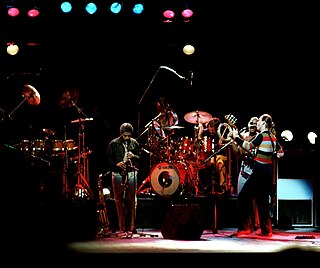
Weather Report was an American jazz fusion band active from 1970 to 1986. The band was founded in 1970 by Austrian keyboardist Joe Zawinul, American saxophonist Wayne Shorter, Czech bassist Miroslav Vitouš, American drummer Alphonse Mouzon as well as American percussionists Don Alias and Barbara Burton. The band was initially co-led by Zawinul and Shorter but as the 1970s progressed, Zawinul became the primary composer and creative director of the group. Other prominent members throughout the band’s history included bassists Jaco Pastorius, Alphonso Johnson and Victor Bailey, drummers Chester Thompson and Peter Erskine, and percussionists Airto Moreira and Alex Acuña. A quintet of Zawinul & Shorter with a bassist, a drummer and a percussionist was the standard formation for Weather Report.
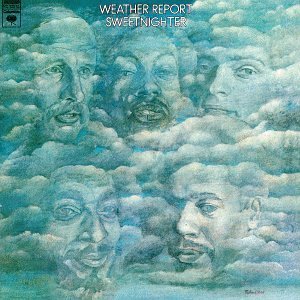
Sweetnighter is the third studio album by American jazz fusion band Weather Report, released by Columbia Records in 1973.

8:30 is the second live album from the jazz fusion group Weather Report, issued in 1979 by ARC/Columbia Records. The album rose to No. 3 on the Billboard Jazz Albums chart and No. 47 on the Billboard 200 chart. 8:30 also won a Grammy Award for Best Jazz Fusion Performance.
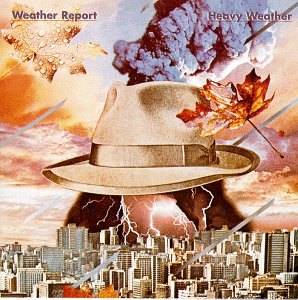
Heavy Weather is the seventh album by Weather Report, released in 1977 through Columbia Records. By 1991, the release had sold 1,000,000 copies in America alone; it would prove to be the band's most commercially successful album and one of the best sellers in the Columbia jazz catalog. DownBeat magazine gave Heavy Weather a 5-star review, and later its readers voted it jazz album of the year.

Black Market is the sixth studio album by American jazz fusion band Weather Report. Released in 1976, it was produced by Joe Zawinul and Wayne Shorter. It was recorded between December 1975 and January 1976 and released in March 1976 through Columbia Records.
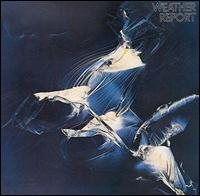
Weather Report is the debut studio album by American jazz fusion band Weather Report, released on May 12, 1971, by Columbia Records. The album was reissued by Sony and digitally remastered by Vic Anesini in November 1991 at Sony Music Studios in New York City.

I Sing the Body Electric is the second studio album released by the American jazz fusion band Weather Report in 1972.

Mysterious Traveller is the fourth studio album by the jazz and jazz fusion ensemble Weather Report and was released in 1974. This was their final recording with founding bassist Miroslav Vitouš, who left due to creative differences. Vitouš was replaced by Alphonso Johnson. Another addition to the line-up is drummer Ishmael Wilburn. Greg Errico was the drummer for the tour between the previously released Sweetnighter and this album, but declined an invitation to be a permanent member of the band.

Tale Spinnin' is the fifth studio album by Weather Report, recorded and released in 1975, featuring the addition of drummer Leon "Ndugu" Chancler, who was recruited after Joe Zawinul heard him play with Carlos Santana. Weather Report was recording in the studio next door to Ndugu, and asked him to join them for “one session”. That session ended up lasting a week and produced Tale Spinnin'. Ndugu was asked to join as a permanent member, but decided to stay with Santana.
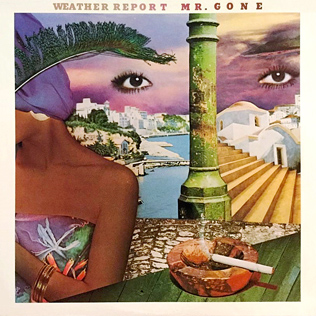
Mr. Gone is the eighth studio album by jazz fusion band Weather Report released in 1978 by ARC/Columbia Records. The album reached number one on the Billboard Jazz Albums chart.

Night Passage is the ninth studio album by Weather Report, released in 1980. The tracks were recorded on July 12 and 13, 1980, at The Complex studios in Los Angeles, except for "Madagascar", recorded live at the Festival Hall, Osaka, Japan on June 29 of the same year.

Weather Report is the tenth studio album by the American jazz fusion band Weather Report, released in January 1982; there was some confusion among consumers and retailers upon its release as the band's first album (1971) was also self-titled. It is the final album featuring bass guitarist Jaco Pastorius and drummer Peter Erskine in the rhythm section.
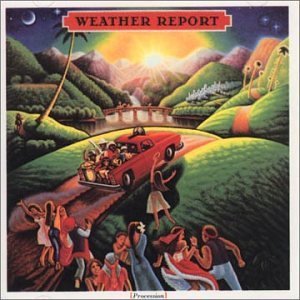
Procession is the eleventh studio album by the jazz fusion band Weather Report. It was released in 1983 through Columbia Records. Although several previous Weather Report tracks included wordless singing, and "And Then" from Mr. Gone included brief lyrics, "Where the Moon Goes" was the band's first track including lyrics throughout, sung by members of the Manhattan Transfer. The band would continue to feature vocals on the next three studio albums.
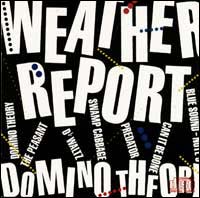
Domino Theory is the twelfth studio album by jazz fusion band Weather Report, released in April 1984. It is the second studio album to feature the Hakim-Bailey-Rossy rhythm section. The album contains seven tracks, three of which were recorded live.

Sportin' Life is the thirteenth studio album by American jazz fusion band Weather Report which was released in June 1985 through Columbia Records. Although featuring many more vocal performances than any of their previous studio albums, words are rare and most vocals are chants from guest musicians such as Bobby McFerrin or Carl Anderson. The album is named after a character from Porgy and Bess. Sportin' Life was to be the last Weather Report studio album, but due to contractual obligations with Columbia the band had to release a follow-up, This Is This!, in 1986.
"Birdland" is a jazz/pop song written by Joe Zawinul of the band Weather Report as a tribute to the Birdland nightclub in New York City, which appeared on the band's 1977 album Heavy Weather. The Manhattan Transfer won a Grammy Award with their 1979 version of the song, which had lyrics by Jon Hendricks. Quincy Jones won two Grammy Awards for the version of the piece he included on his 1989 album Back on the Block. The leading Cuban band Los Van Van included an extended interpolation of the piece in their song Tim Pop/Birdland.

Live in Tokyo is the third release, and first live album by Weather Report. Originally released by CBS/Sony in Japan only, it was not released in the US until a 2014 CD reissue by Wounded Bird Records. Recording took place on January 13, 1972, one of five sold-out concerts played in Japan during that January. I Sing the Body Electric (1972) contained several tracks that were edited for the studio album, but can be heard as they were performed, in their entirety, on this live album.

Live and Unreleased is a compilation of live recordings of the jazz fusion band Weather Report, released on Legacy Recordings in 2002. The tracks are taken from live performances that took place from November 27, 1975 to June 3, 1983. It is their third official live recording after the Japan-only Live in Tokyo from 1972 and 8:30 from 1979, although previous albums such as Heavy Weather (1977) and Night Passage (1980) also included occasional live tracks.

Mino Cinélu is a French musician. He plays multiple instruments. He is a composer, programmer and producer; and is primarily associated with his work as a jazz percussionist.

Zawinul is the third studio album by jazz composer and pianist Joe Zawinul recorded in 1970 by Zawinul performing music arranged for two electric pianos, flute, trumpet, soprano saxophone, two contrabasses, and percussion. The album reached number 17 in the Billboard Jazz album charts.



















